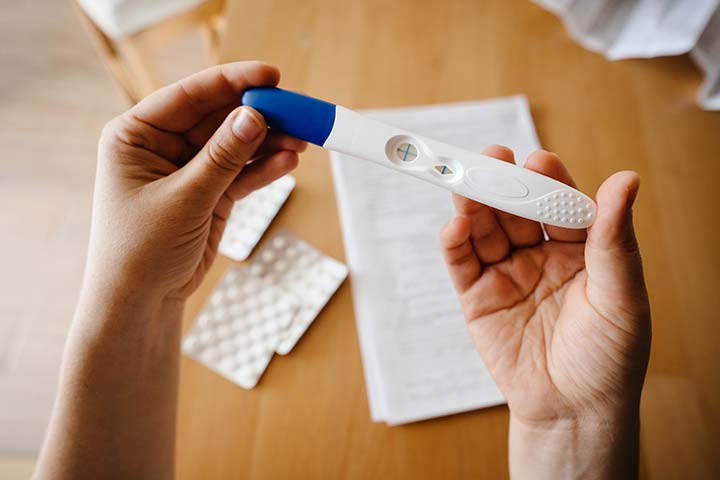
Image: Shutterstock
As bloating and early-stage pregnancy have a lot of symptoms in common, one may find it hard to differentiate between the two. Bloating is quite common and can happen to anyone. In fact, most people will experience bloating at some point in their life. It’s quite normal for a lot of women to experience bloating during or right before the start of their menstrual cycle. Bloating during pregnancy can start in the early stages of the gestation period. This is a result of the hormonal changes slowing down the digestive process (1). Hormones such as estrogen and progesterone change before and during the onset of a period, and this could cause bloating. In a study that was conducted, it was found that 62% of women suffered from bloating before their period, and 51% experienced bloating during their period (2).
Here’s How To Know If You Are Pregnant Or Just Bloated
The best way to tell if you are pregnant is if you have missed a period. This is why it’s extremely important to keep a track of the dates of the onset of your period. In this day and age of modern technology, this becomes even easier to do because there are a number of apps available that help you keep track of your period. If you have been actively lovemaking for a while, especially during the fertile window of your cycle and have not used any protection, then there is a possibility you are pregnant.
Early pregnancy symptoms vary from person to person. However, many women experience spotting or nausea during the start of their pregnancy. Spotting is also known as implantation bleeding and will only occur if you are pregnant. Missing a period is the most obvious sign. However, it is quite common for women to also experience breast swelling and tenderness. This is due to the change in hormone levels, namely estrogen (3).
The American College Of Obstetrician and Gynecologists says that nausea usually develops in the first nine weeks. This is because pregnancy hormones begin to increase during this time (4).
If you are experiencing bloating, then it may often be accompanied by stomach pain and gas. Sometimes if you listen closely, you may also hear your tummy rumble. While pregnancy will generally take some time to increase the size of your stomach, bloating will almost immediately result in your stomach showing an increase in the size. Bloating is often accompanied by excessive burping or belching. Excessive flatulence and the urge to have a bowel movement can also be a sign of bloating. When the gastrointestinal tract becomes filled with air or gas, it leads to bloating (5).
What Causes Bloating?
Well, bloating can be caused by a number of unhealthy lifestyle choices such as smoking, overeating, and chewing too fast. Constipation, reflux, and menstruation are other reasons why a person may experience bloating. Drinking some water and taking prescribed medication can usually help ease bloating and the gas that accompanies it (6).
The best way to know if you’re pregnant or simply bloated up is to purchase an at-home pregnancy test. These are easily available at all leading chemist and pharmacist shops. Usually, people recommend waiting for at least a week after you have missed your period to take this test. Taking the test first thing in the morning will help give you the most accurate results. This is because the HCG hormone is the most concentrated the first time you use the bathroom in the morning. These tests are inexpensive and usually quite trustworthy. They are easy to dispose as well.
If you don’t plan on getting pregnant, then we highly recommend taking precautionary measures while lovemaking. If you are still unsure as to whether or not you are pregnant or bloated, then a visit to a doctor will help give you get an answer.















